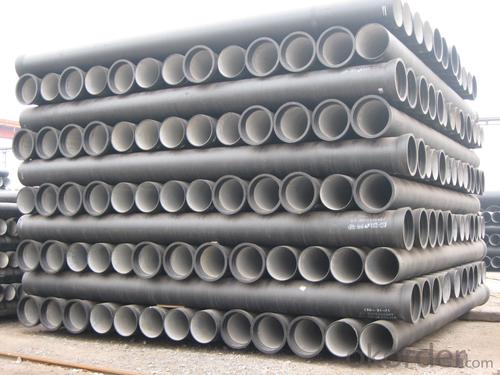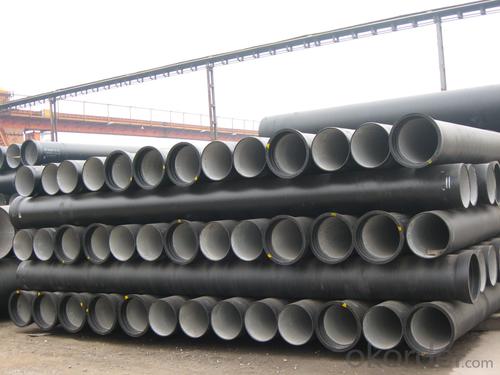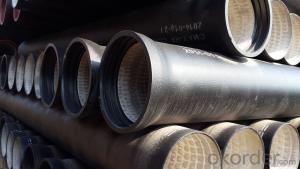Ductile Iron Pipe DN250
OKorder Service Pledge
Quality Product, Order Online Tracking, Timely Delivery
OKorder Financial Service
Credit Rating, Credit Services, Credit Purchasing
You Might Also Like
Specifications
Quick Details
| Place of Origin: | China (Mainland) | Brand Name: | CMAX | Model Number: | T type / K type / Flange type |
| Length: | 6m / 5.7m / Negotiable | Standard: | ISO2531 / EN545 / EN598 | Application: | Potable / Sewage water |
| Diameter: | DN80~DN2200 | Shape: | Round | Hardness: | 230 |
| Pipe Wall Thickness: | standard | Pull Strength: | 420 | Yield (≥ MPa): | 300 |
| Material: | Ductile Iron | Type: | Centrifugal ductile cast iron pipe | Certification: | ISO2531 / EN545 / EN598 |
| Outer Diameter: | 80-2200 | Thickness: | standard | Specification: | DN80~DN2200 |
| |
The advantages to the customer:
Trustworthy financial strength.
One-stop shopping.
Fast and efficient service.
Coordination of shipments from multiple plants.
Specialists of the overseas shipping process.
A more competitive price.
- Q: Is it better to use steel tubes or ductile iron pipes for water supply?
- In summary, if the demand is not high, the use of stable environment, pressure and vibration is not a place recommend the use of ductile iron pipe; if is an important facility for high requirements or site conditions, abnormal conditions, vibration and impact may be relatively large, with ordinary seamless steel tube.
- Q: Can ductile iron pipe be used for potable water systems?
- Yes, ductile iron pipe can be used for potable water systems. Ductile iron is a strong and durable material that is resistant to corrosion and can withstand high pressure and flow rates. It has been widely used in potable water systems for many years due to its reliability and longevity. However, it is important to ensure that the pipe is properly coated or lined to prevent any leaching of iron into the water.
- Q: What's the difference between grey cast iron pipe and ductile iron pipe?
- Spheroidal graphite cast iron and ordinary cast iron contain graphite monomer, that is to say, cast iron is a mixture of iron and graphite. The graphite in ordinary cast iron is flaky, and the strength of graphite is very low, so there are many flakes of voids in the cast iron, so the strength of ordinary cast iron is lower and more brittle. Graphite in graphite cast iron is spherical, equivalent to the existence of many spherical voids in cast iron. The effect of spherical voids on the strength of cast iron is much smaller than that of sheet voids, so the strength of nodular cast iron is much higher than that of ordinary cast iron.
- Q: Are ductile iron pipes suitable for use in industrial applications?
- Yes, ductile iron pipes are suitable for use in industrial applications. They have excellent strength and durability, making them ideal for transporting water, chemicals, and other fluids in industrial settings. Ductile iron pipes are also resistant to corrosion, which is crucial for maintaining a long lifespan in industrial environments. Additionally, their flexibility and ease of installation make them a cost-effective choice for industrial applications.
- Q: What are the typical maintenance requirements for ductile iron pipe?
- The typical maintenance requirements for ductile iron pipe involve regular inspection, cleaning, and repair. Inspection is a crucial aspect of maintaining ductile iron pipe and should be conducted periodically to identify any signs of damage, corrosion, or leaks. This can be done through visual inspection, as well as the use of non-destructive testing techniques like ultrasonic or magnetic particle testing. Regular inspections help in detecting and addressing any issues before they escalate and cause significant damage. Cleaning is another important maintenance requirement for ductile iron pipe. Over time, sediment, scale, and other debris can accumulate inside the pipe, reducing its flow capacity and potentially causing blockages. Regular cleaning using methods like high-pressure water jetting or mechanical cleaning can help remove these deposits, ensuring optimal flow and preventing any issues related to reduced water flow or pressure. Repairing any damage or corrosion is an essential maintenance requirement for ductile iron pipe. If any cracks, leaks, or other forms of damage are detected during the inspection, prompt repair is necessary to prevent further deterioration and potential failure. Depending on the extent of the damage, repairs can include methods like welding, epoxy lining, or even replacement of the affected section of the pipe. In addition to these specific maintenance requirements, it is also important to implement a comprehensive maintenance program that includes preventative measures. This may involve measures like cathodic protection, which helps prevent corrosion, or the application of protective coatings to extend the lifespan of the pipe. Overall, regular inspection, cleaning, and repair are the typical maintenance requirements for ductile iron pipe. Adhering to these maintenance practices ensures the longevity, reliability, and optimal performance of the pipe system, minimizing the risk of failures and disruptions.
- Q: Are ductile iron pipes suitable for use in cooling water systems?
- Yes, ductile iron pipes are suitable for use in cooling water systems. They offer excellent strength, durability, and corrosion resistance, making them ideal for transporting water at varying temperatures. Additionally, their flexibility allows them to withstand pressure and temperature changes, ensuring long-lasting and reliable performance in cooling water applications.
- Q: How many meters does the cast iron water supply pipe dn150,1 tons?
- When pouring added calcium alloy in the flow inlet for graft inoculation, every time after the pouring, need in the mold surface with compressed air spraying a thin layer of dry calcium silicate powder, a centrifuge is composed of upper and lower halves of the closed shell, the supporting cast roller is installed on the bottom of the shell, the mold in front of a ring gear mounted on the housing at the end of the DC motor through the transmission gear direct mold, shell mold through Hugh ends are equipped with sealing ring, the front end of the shell shell installed with half ring a turning cylinder pictophonetic mountain Rae centrifuge under the wheels, so as to make reciprocating motion on the inclined orbit
- Q: What are the advantages of using ductile iron pipes over other materials?
- There are several advantages of using ductile iron pipes over other materials. Firstly, ductile iron pipes have superior strength and durability compared to other materials such as PVC, HDPE, or concrete pipes. They have a high tensile strength, which means they can withstand higher pressure and can handle heavy loads without cracking or breaking. This makes them suitable for various applications, including water and sewage systems, as well as industrial pipelines. Secondly, ductile iron pipes have excellent corrosion resistance. They are typically coated with a protective layer, such as zinc or epoxy, which prevents the formation of rust and extends their lifespan. This makes them ideal for underground installations or in areas with aggressive soil conditions or corrosive substances. Another advantage of ductile iron pipes is their flexibility. They can be manufactured in various lengths, diameters, and angles, allowing for easy installation and adaptability to different project requirements. Additionally, their flexibility enables them to withstand ground movements, such as settlement or seismic activities, without causing significant damage. Furthermore, ductile iron pipes have a smooth internal surface, which reduces friction and improves flow efficiency. This results in lower energy consumption for pumping systems and reduced maintenance costs. Additionally, the smooth surface minimizes the risk of deposits or clogs, ensuring a consistent and uninterrupted flow of fluids. Lastly, ductile iron pipes have a long service life. When properly installed and maintained, they can last for over 100 years. This longevity not only reduces the need for frequent replacements but also provides a sustainable and cost-effective solution for infrastructure projects. In conclusion, the advantages of using ductile iron pipes over other materials include their superior strength, corrosion resistance, flexibility, smooth internal surface, and long service life. These qualities make them a reliable choice for various applications, providing efficient and durable solutions for water, sewage, and industrial pipelines.
- Q: Can ductile iron pipe be used for stormwater management systems?
- Yes, ductile iron pipe can be used for stormwater management systems. Ductile iron pipe is commonly used in various applications, including stormwater drainage systems. It is known for its strength, durability, and resistance to corrosion, making it ideal for withstanding the harsh conditions of stormwater management. Additionally, ductile iron pipe is easily installed and maintained, making it a cost-effective choice for stormwater management systems. Overall, ductile iron pipe is a reliable and suitable option for constructing stormwater management systems.
- Q: Can ductile iron pipes be used in coastal or marine environments?
- Ductile iron pipes are applicable for coastal or marine environments. This type of cast iron has been treated with magnesium to enhance its strength, ductility, and resistance to corrosion. As a result, it can be used in environments with high moisture levels, like coastal or marine areas. Coastal and marine environments are characterized by their high saltwater levels, which can lead to metal pipe corrosion. However, ductile iron pipes possess an excellent resistance to corrosion thanks to their protective coating. This coating acts as a barrier between the pipe and the corrosive elements present in saltwater, preventing rust formation and prolonging the pipes' lifespan. Moreover, ductile iron pipes can withstand the high pressures and stresses associated with coastal and marine applications. They possess high tensile strength, enabling them to support the weight of soil, rocks, and other materials that may be present in these environments. Furthermore, ductile iron pipes are resilient to damage caused by external forces like waves or debris, making them a dependable choice for coastal or marine projects. In conclusion, ductile iron pipes are a suitable option for coastal or marine environments due to their corrosion resistance, high tensile strength, and durability. They can reliably transport water or other fluids in these challenging environments while maintaining their structural integrity for an extended period.
Send your message to us
Ductile Iron Pipe DN250
OKorder Service Pledge
Quality Product, Order Online Tracking, Timely Delivery
OKorder Financial Service
Credit Rating, Credit Services, Credit Purchasing
Similar products
Hot products
Hot Searches
Related keywords






















